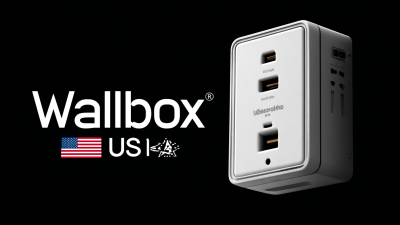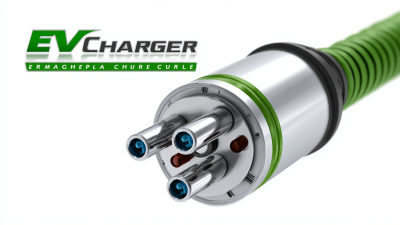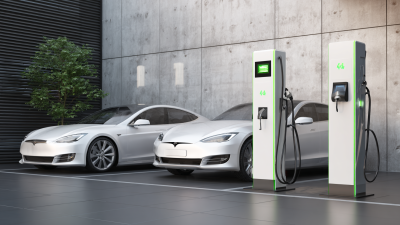In the rapidly evolving landscape of sustainable business practices, the integration of renewable technologies is more crucial than ever. One of the most effective solutions driving this transformation is the adoption of Car Fast EV Chargers. As we approach 2024, businesses are increasingly recognizing the multifaceted benefits these high-speed charging stations offer. Not only do they enhance customer satisfaction by minimizing wait times for electric vehicle charging, but they also position companies as leaders in sustainability, attracting environmentally conscious consumers. Moreover, incorporating Car Fast EV Chargers into business operations can lead to significant cost savings and improved operational efficiency. This blog will explore five essential benefits of Car Fast EV Chargers, illustrating how they can catalyze sustainable growth and solidify a company’s commitment to a greener future. Join us as we delve into this transformative technology that is paving the way for responsible innovation and business success.

The automotive landscape is undergoing a significant transformation, driven primarily by the rise of electric vehicles (EVs) and the infrastructure that supports them. As cities and businesses alike adapt to this revolution, fast EV chargers have emerged as a critical component in fostering a sustainable future. These chargers are not merely accessories; they are pivotal in facilitating the widespread adoption of electric vehicles, allowing drivers to quickly recharge their cars, thereby eliminating range anxiety and enhancing convenience.
Fast EV chargers are increasingly becoming essential for businesses looking to thrive in this evolving marketplace. By installing these chargers, companies can attract environmentally conscious consumers and reduce their carbon footprint. This aligns with sustainability goals while also offering a competitive edge, as businesses that prioritize EV infrastructure position themselves as leaders in the green economy. Moreover, the integration of fast charging stations can lead to increased foot traffic and customer engagement, ultimately driving growth and profitability in 2024 and beyond. As the shift towards electric mobility accelerates, embracing this change will be vital for businesses aiming to remain relevant and successful.

As the electric vehicle (EV) market continues to expand, enhancing the customer experience through fast EV chargers has emerged as a critical strategy for sustainable business growth. Recent reports show that customer satisfaction with public EV charging is on the rise, with users particularly appreciating the speed of fast chargers. Improving charging times not only addresses a common concern among EV users but also plays a significant role in increasing the adoption of electric vehicles. According to a J.D. Power study, reliability of EV chargers has improved, thus reinforcing the positive trends in customer satisfaction.

Partnerships in the industry are focusing on developing next-generation charging technologies that prioritize consumer experience. For instance, companies are investing in AI-driven solutions to streamline the charging process while also aiming for energy efficiency and cost savings. Additionally, the introduction of ultra-fast charging stations demonstrates a commitment to enhancing infrastructure, ensuring that EV owners can access swift and reliable charging when needed. This emphasis on customer-centric solutions is vital for not only retaining existing EV owners but also attracting new customers in an increasingly competitive market.
In the evolving landscape of sustainable business practices, fast EV chargers are becoming a game-changer. By installing these chargers, businesses not only contribute to a greener environment but also boost their revenue streams. Fast EV chargers can significantly increase foot traffic, as electric vehicle owners actively seek convenient charging solutions while they shop or dine. This not only opens the doors to new customers but enhances overall customer satisfaction, creating a positive feedback loop that encourages repeat visits.
Moreover, fast EV chargers can act as a valuable marketing tool. By positioning themselves as environmentally conscious businesses, companies can attract a clientele that prioritizes sustainability. Highlighting the availability of fast chargers on social media and websites can engage eco-minded consumers, further drawing attention to their offerings. As customers enjoy their electric vehicle charging experience, they are likely to spend more time—and money—at the business, maximizing the potential for increased sales. By investing in fast EV chargers, businesses position themselves at the forefront of the green movement while simultaneously enhancing their bottom line.
As businesses increasingly prioritize sustainability, the integration of electric vehicle (EV) charging solutions has become a strategic move that enhances brand reputation. According to a 2023 report by the International Energy Agency (IEA), global sales of electric cars hit 10 million in 2022, marking a 55% increase over the previous year. This surge in EV adoption underscores the growing consumer demand for sustainable practices, which directly impacts brand loyalty and reputation. Companies that invest in fast EV chargers not only meet regulatory requirements but also position themselves as leaders in the sustainability movement.
Moreover, a study by Deloitte revealed that 63% of consumers are more likely to purchase from brands with a strong commitment to sustainability. By offering convenient EV charging solutions, businesses are not only catering to eco-conscious customers but also enhancing their corporate image. Fast EV chargers provide an efficient way for customers to power their vehicles while patronizing a business, effectively creating an additional touchpoint that fosters loyalty. In 2024, as the push for eco-friendly initiatives intensifies, companies that capitalize on these charging solutions will likely experience significant growth in both customer base and brand equity.
| Benefit | Description | Impact on Sustainability | Brand Reputation |
|---|---|---|---|
| Reduced Carbon Footprint | Fast EV chargers help businesses reduce greenhouse gas emissions. | Contributes to a more sustainable environment. | Enhances eco-friendly brand image. |
| Customer Attraction | Offering EV charging stations attracts more customers. | Supports the transition to electric vehicles. | Positions the brand as a forward-thinking leader. |
| Cost Savings | Lower operating costs for businesses utilizing electric vehicles. | Reduces dependency on fossil fuels. | Demonstrates financial responsibility. |
| Enhanced Employee Satisfaction | Employees appreciate access to EV charging at work. | Encourages sustainable commuting options. | Strengthens employer brand. |
| Future-Proofing | Investment in EV chargers prepares businesses for future trends. | Supports long-term sustainability goals. | Showcases commitment to innovation. |
As the world increasingly shifts towards sustainable energy, future-proofing your business by adopting electric vehicle (EV) infrastructure has never been more crucial. Implementing fast EV chargers not only aligns your business with eco-friendly practices but also enhances your brand's reputation among environmentally conscious consumers. By offering EV charging stations, businesses demonstrate their commitment to sustainability, which can drive customer loyalty and attract a wider audience seeking green options.
Tip: Assess the specific needs of your clientele when selecting EV chargers. Understanding the usage patterns of your customers can help you choose the right charging speed and infrastructure to maximize convenience and accessibility.
Moreover, investing in EV infrastructure can bring about long-term cost benefits. While initial installation may seem daunting, the operational costs associated with maintaining EV chargers can be significantly lower than fossil fuel counterparts. This transition may also open up government incentives or grants designed to promote green energy solutions.
Tip: Stay informed about local regulations and incentives that support EV infrastructure. This knowledge can help your business take advantage of potential financial support while ensuring compliance with upcoming policies aimed at reducing carbon footprints.














